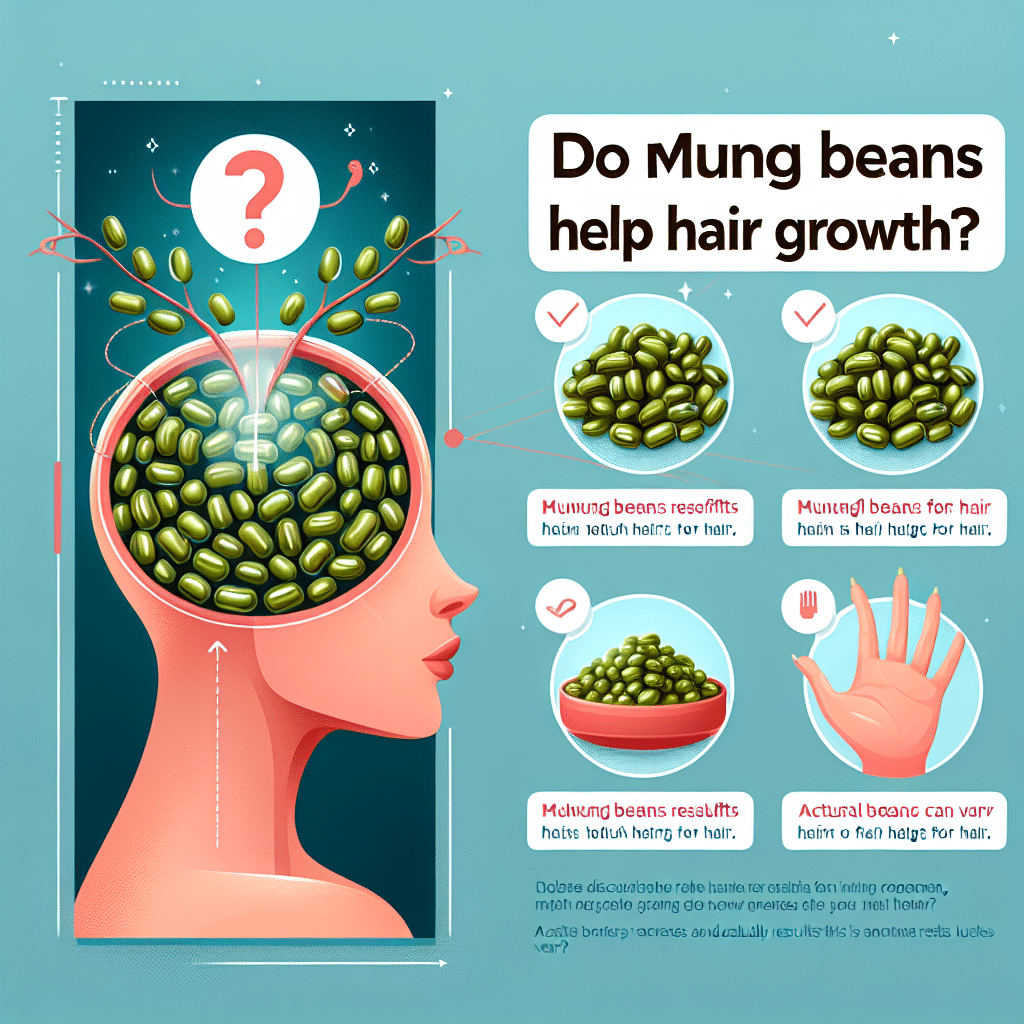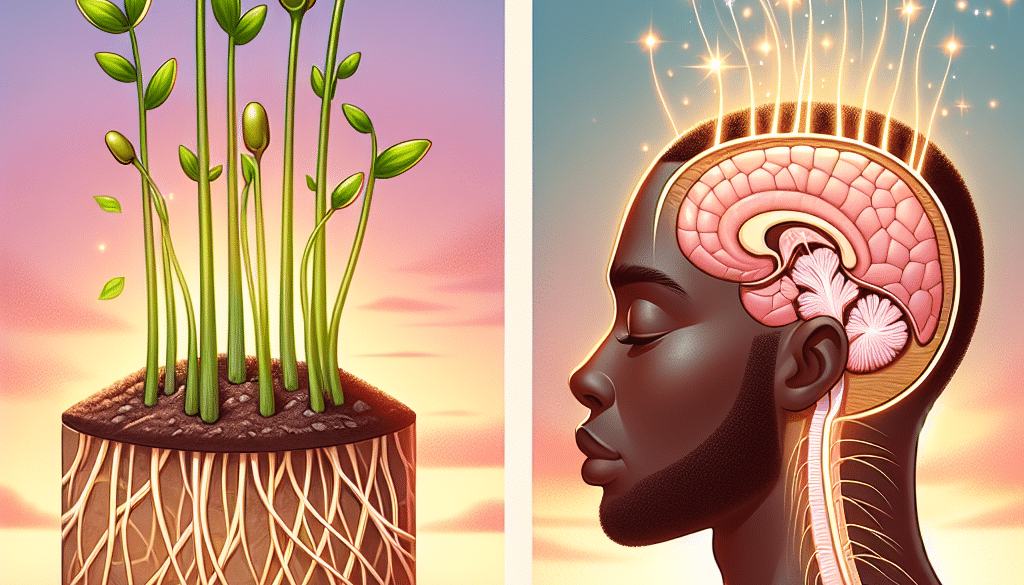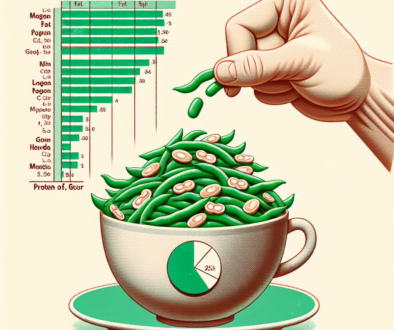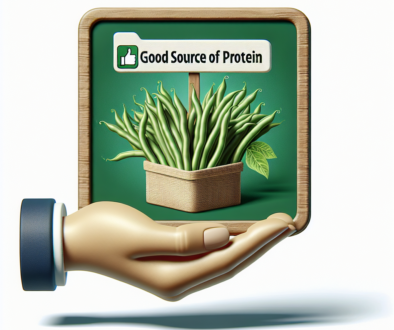Does Mung Beans Help Hair Growth?
-
Table of Contents
- Mung Beans and Hair Growth: Unveiling the Potential Benefits
- Understanding Hair Growth
- Nutritional Profile of Mung Beans
- Scientific Evidence on Mung Beans and Hair Growth
- How to Incorporate Mung Beans into Your Diet for Hair Health
- Case Studies and Anecdotal Evidence
- Limitations and Considerations
- Conclusion: Mung Beans as Part of a Hair-Healthy Diet
- Discover ETprotein’s Range of Protein Products
Mung Beans and Hair Growth: Unveiling the Potential Benefits

Hair growth and health are influenced by a myriad of factors, including genetics, hormones, and nutrition. Among the various nutritional elements, proteins and specific micronutrients play a crucial role in hair structure, growth, and overall scalp health. Mung beans, a staple in many Asian cuisines, have been touted for their health benefits, including potential positive effects on hair growth. This article delves into the science behind mung beans and their possible role in promoting healthier, stronger hair.
Understanding Hair Growth
Hair growth occurs in a cycle that includes the anagen (growth phase), catagen (transitional phase), and telogen (resting phase). Nutrition is a key factor in supporting the anagen phase, where cells in the root of the hair are rapidly dividing, and new hair is formed. A deficiency in essential nutrients can lead to hair loss or weakened hair structure.
Nutritional Profile of Mung Beans
Mung beans are a rich source of protein, which is vital for hair growth since hair is primarily made of keratin, a type of protein. They also contain essential amino acids, the building blocks of protein, which the body cannot synthesize on its own. Additionally, mung beans are packed with other hair-friendly nutrients:
- Vitamins, such as vitamin C and B vitamins including biotin (B7), folate (B9), and niacin (B3), which are known to support hair health.
- Minerals like iron, zinc, and selenium, which are crucial for hair growth and preventing hair loss.
- Antioxidants that protect hair follicles from damage caused by free radicals.
Scientific Evidence on Mung Beans and Hair Growth
While direct research on mung beans specifically for hair growth is limited, studies on the nutrients they contain provide insights into how they may benefit hair health:
- Protein: A study published in the Journal of Investigative Dermatology found that a diet rich in amino acids could prolong the anagen phase of the hair growth cycle.
- Biotin: Biotin deficiencies have been linked to hair loss, and supplementation is often recommended for hair growth, as per research in the Journal of Clinical and Aesthetic Dermatology.
- Iron and Zinc: A study in the Journal of Drugs in Dermatology highlighted the role of iron and zinc in hair follicle health and suggested that deficiencies in these minerals could lead to hair loss.
These studies suggest that the nutrients found in mung beans may contribute to a healthy hair growth cycle and prevent hair loss.
How to Incorporate Mung Beans into Your Diet for Hair Health
Adding mung beans to your diet is simple and can be done in various ways:
- Enjoy them cooked in soups, stews, or salads.
- Use sprouted mung beans as a crunchy addition to sandwiches or wraps.
- Blend cooked mung beans into smoothies or use mung bean flour in baking.
Consistent consumption of mung beans, as part of a balanced diet, may contribute to better hair health over time.
Case Studies and Anecdotal Evidence
While scientific research is foundational, anecdotal evidence and case studies also offer insights into the benefits of mung beans for hair growth. Many individuals report improved hair texture and reduced hair fall after incorporating mung beans into their diets. However, it’s important to note that such evidence should be considered alongside scientific research for a comprehensive understanding.
Limitations and Considerations
While mung beans are generally safe for consumption, individuals with specific health conditions or allergies should consult with a healthcare provider before making significant dietary changes. Additionally, hair growth is complex and can be influenced by factors beyond diet, such as stress, hormonal imbalances, and genetics.
Conclusion: Mung Beans as Part of a Hair-Healthy Diet
In conclusion, while direct research on mung beans and hair growth is limited, the nutritional content of these legumes—rich in protein, vitamins, and minerals—supports the notion that they can be beneficial for hair health. Incorporating mung beans into a balanced diet, alongside other nutrient-rich foods, may contribute to stronger, healthier hair. However, it’s important to maintain realistic expectations and understand that results may vary from person to person.
Discover ETprotein’s Range of Protein Products
If you’re looking to enhance your diet with high-quality protein sources, consider ETprotein’s range of organic bulk vegan proteins. Their mung bean protein is an excellent choice for those seeking to support hair growth and overall health. ETprotein’s products are characterized by a neutral taste, non-GMO, allergen-free attributes, and high purity levels, making them suitable for various industries and dietary preferences.
About ETprotein:
ETprotein, a reputable protein and L-(+)-Ergothioneine (EGT) Chinese factory manufacturer and supplier, is renowned for producing, stocking, exporting, and delivering the highest quality organic bulk vegan proteins and L-(+)-Ergothioneine. They include Organic rice protein, clear rice protein, pea protein, clear pea protein, watermelon seed protein, pumpkin seed protein, sunflower seed protein, mung bean protein, peanut protein, and L-(+)-Ergothioneine EGT Pharmaceutical grade, L-(+)-Ergothioneine EGT food grade, L-(+)-Ergothioneine EGT cosmetic grade, L-(+)-Ergothioneine EGT reference grade and L-(+)-Ergothioneine EGT standard. Their offerings, characterized by a neutral taste, non-GMO, allergen-free attributes, with L-(+)-Ergothioneine purity over 98%, 99%, cater to a diverse range of industries. They serve nutraceutical, pharmaceutical, cosmeceutical, veterinary, as well as food and beverage finished product distributors, traders, and manufacturers across Europe, USA, Canada, Australia, Thailand, Japan, Korea, Brazil, and Chile, among others.
ETprotein specialization includes exporting and delivering tailor-made protein powder and finished nutritional supplements. Their extensive product range covers sectors like Food and Beverage, Sports Nutrition, Weight Management, Dietary Supplements, Health and Wellness Products, and Infant Formula, ensuring comprehensive solutions to meet all your protein needs.
As a trusted company by leading global food and beverage brands and Fortune 500 companies, ETprotein reinforces China’s reputation in the global arena. For more information or to sample their products, please contact them and email sales(at)ETprotein.com today.












